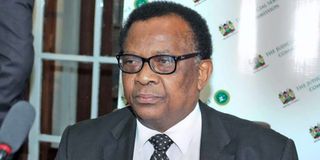Nzamba had endorsed constitutional review as proposed in BBI

Former Committee of Experts (CoE) chairman Nzamba Kitonga. He collapsed and died on October 24, 2020.
What you need to know:
- Kitonga, who died on Saturday, had expressed his concurrence on the need to correct certain fundamental gaps in the existing constitution.
In an interview with the Nation earlier this year, the lawyer said the three arms of government needed slight adjustments to address political inclusivity and negative ethnicity.
Nzamba Kitonga, the lawyer who chaired the Committee of Experts that drafted the Constitution, had endorsed the clamour for its review.
Alhough Kitonga, who died on Saturday, missed the launch of the Building Bridges Initiative report at the Bomas of Kenya on Monday, he had expressed his concurrence on the need to correct certain fundamental gaps in the existing constitution.
In an interview with the Nation earlier this year, the lawyer said time was ripe to review the 2010 constitution to address what he called “matters arising”.
“As a committee, we envisaged a review of the constitution would be done after a period of seven to 10 years, when the challenges of the new laws would have been experienced and identified by Kenyans,” the senior counsel had said.
He said the three arms of government — the Executive, the Legislature and the Judiciary — needed slight adjustments to address political inclusivity and negative ethnicity, reduce the public wage bill and make the judicial system more effective.
Progressive constitution
President Kenyatta, who led other leaders in celebrating the role Kitonga played in the country’s constitutional review, described the 2010 constitution as generally good and progressive, but clarified that it had gaps that needed to be sealed.
In the interview, Mr Kitonga said the presidential system of government adopted in Naivasha during the final phase of the review is a winner-take-all model that had proved unworkable in Kenya because it excludes most communities from governance.
“The draft the Committee of Experts came up with was a hybrid system. It was both presidential and parliamentary to accommodate the opposition parties and make our politics less contentious” he said.
The version we have, he said, was “heavily watered down” by politicians to provide for a pure presidential system, which Kenyans had rejected during the long and arduous constitutional review process.
Leader of Official Opposition
“We had provided for a fully fledged constitutional office for the Leader of Official Opposition, who would be sitting in Parliament, but which was removed, making large sections of Kenyans to feel excluded from governance if they lose elections,” he explained.
He said ODM leader Raila Odinga and his running mate Kalonzo Musyoka, who lost the presidential contest in 2013 and 2017 to President Kenyatta and his deputy William Ruto, should have had constitutional offices to enable them to properly check the ruling Jubilee Party.
On the Judiciary, Kitonga cited the Judicial Service Commission, which he argued should be composed of retired judges and senior lawyers, as opposed to the current situation where recruitment and disciplining of judicial staff is handled by serving judges and magistrates.
“Ours is not an ideal model. It breeds suspicions and unfairness because a judge cannot get fair trial in a tribunal that consists of people with vested interests, perhaps in his or her job”, he said, adding that this had been manifested in the matters before the JSC, which have dragged for long and have been dogged by controversies.
Kitonga said his committee never anticipated that both levels of governments and their respective assemblies would be wasteful or mismanage public resources.
The whole system of government, the former Law Society of Kenya chairman said, is “complex and expensive” and, therefore, should be reviewed to eliminate duplication of roles in the counties and the national government and to make it more effective and less bureaucratic.
The CoS, Kitonga said, also never envisaged that the Independent Electoral and Boundaries Commission would create the huge number of constituencies and wards, adding that can be addressed by amending the Elections Act.
There have been concerns about the number of elected members of the two houses of Parliament and the cost of running the devolved units, with some politicians calling for the scrapping of the Senate and reduction of the counties.




